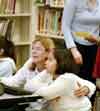21st Century Skills - AASL and ISTE Standards
Can they make up their own minds? |
|||||
   |
Join Jamie McKenzie for an exciting morning devoted to the challenge of engaging students in synthesis, invention, imagination and novelty. What can teachers do so that students grow beyond mere cutting and pasting? Outline of content below. You can register and pay for the seminar at http://fno.org/fnopress/books.html This is a large group, auditorium session with Jamie presenting and demonstrating effective teaching techniques to strengthen the inventiveness of students. Despite all the talk about Web 2.0, inventiveness is unlikely to emerge simply because students gather online. Jamie shows how we must equip students with a toolkit of synthesis strategies if we hope to see them develop good new ideas of their own. |
||||
| New standards from the American School Librarians and ISTE both call for students to do more than gather information when they research. They set the expectation that students develop good new ideas, not just scoop and smush, copy and paste. This session will provide participants with a toolkit of synthesis skills required to invent good new ideas along with strategies to equip their students with the creative capacity to meet the standards.
Learners use skills, resources and tools to:
AASL Standards for the 21st-Century Learner Schools and districts that have adopted the 21st Century Skills model for schooling will find this seminar on target, especially for Information Literacy, Media Literacy and ICT (Information, Communications & Technology) Literacy:
Source: 21st Century Skills |
||
|
10:30 AM - 10:45 AM
11:30 AM - 12:30 PM |
 Engaging Students
Engaging Students 




